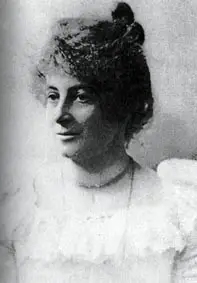The complete monograph by Elizabeth Gibbons:
Side Menu:
5. Marriage and Devotion
On September 2, 1907, William Murdoch married Ada Florence Banks by special license at St. Denys Church in Southampton. The bride was 33, the groom a year older. Both gave their address as Manor Farm Road, probably the home of relatives of Ada; as neither is listed at that address in the City Directory for 1907 they could not have been there long. Murdoch was then First Officer on the Adriatic, and in common with many bachelor officers of the time presumably had no address other than his ship. (His age, 34, was not unusual for matrimony in the Murdoch family, which favored late marriages.)

This portrait of Ada belonged to
William's sister, "Peg", and remained
on her piano until her death.
Ada Banks was born in New Zealand, daughter of James Brightwater Banks, a prosperous land agent; college educated, she was a teacher and may have continued her profession following marriage. Only one photograph seems to survive, taken in the 1890s. In her early 20s at the time, Ada appears the incarnation of the upper class Victorian lady, cultured, aristocratic, serious, with a profile like an ancient coin. Family tradition says they met on the Medic, and as Murdoch was on the Arabic on the Atlantic route from June of 1903, they would have known one another for some years before deciding to marry. Impassioned missives were a part of the age, and since William was in any event the writer of ebullient letters the courtship must have been conducted principally courtesy of the Royal Mail. Ada was a stunning beauty, and dressed in the pastel laces and befeathered hats of the early 1900s would have made an arresting impression when William Murdoch first saw her on the Medic's long, sunny decks.
St. Denys was a brief walk from the house they selected at 94 Belmont Road, Portswood. Still occupied and lovingly preserved, now as then surrounded by trees and hedges, the house is a small one story dwelling built around 1790 as the gatehouse for the long vanished Belmont Park Estate. When suburban developers reached the area in the 1890s, the gatehouse was spared, left in its leafy isolation while more fashionable homes were built around it. It was the sort of quiet retreat that would appeal to newlyweds, but may also indicate a taste for unpretentious surroundings; Murdoch was used to living in compact, unassuming cabins. Nevertheless, it would require at least one servant to run properly in the pre-appliance era a striking commentary on how far a salary of 17 pounds a month could be made to go before the Great War. (Captain Edward J. Smith, Murdoch's commander on Adriatic, Olympic and Titanic lived a short distance away.)
Murdoch arrived back from New York on the Adriatic in mid August, 1907, and was on board for her September 23rd departure, leaving about a month to organize wedding and home a pattern of life that continued to the end. In the four years and seven months of their marriage, William was generally home a few days each month, and apparently for only one Christmas, in 1910.
After Titanic's loss, Ada Murdoch fled Southampton for Brittany, in early Summer, 1912; forced back to Britain by the War, she lived in London until 1918, and then returned permanently to Christchurch, New Zealand. Relatives who fought in France remembered her hospitality and kindness, and also her ineradicable bitterness and hatred for the White Star Line, a contempt intensified, according to her sister in law Margaret Murdoch, by the company's disgracious behavior to her. Ada had not wanted her husband to join the Titanic, but to remain on the Olympic. Whether her reasons were some chilling inner warning or something else more prosaic cannot now be known: she never said.
The Titanic was a bolt from the blue from which Ada never recovered. She did not remarry, and would aver until her own death in the early 1950s that her single disappointment as a wife was the lack of children.
Ada Murdoch, however, was not the only woman shattered by her husband's death. In its April 21, 1912, page 2, coverage of the Senate inquiry then at the Waldorf Astoria, the New York Times included the following:
While Bride was telling his story a young woman pushed her way into the committee room and, weeping, asked those nearest to her what had become of First Officer Murdock [sic] of the Titanic. Nobody had the courage to tell her that he had perished, and she went to Chairman Smith with the question. She was referred to Second Officer Lightoller, who took her to one side and told her the story. The woman sobbed convulsively and presently walked slowly out of the room." (Copyright 1912 by The New York Times Company. Reprinted by kind permission.)
If Lightoller or the New York Times's reporter knew who the lady was they were too discreet to say. She was not a relative; interrupting a hearing of the United States Senate, in the Waldorf Astoria, in 1912, implies an American woman of the Gilded Age upper class; beyond this, nothing can be inferred. Whoever she was, she went away, leaving behind a minor mystery and a public demonstration of profound attachment.
The devotion Murdoch attracted was not confined to women. James McGiffin's affectionate feelings have already been cited, and they were shared by members of Titanic's crew, including Second Officer Lightoller. Walter Lord, researching A Night To Remember, formed the impression that Lightoller and Murdoch were close, and anyone listening to the BBC recording Lightoller made in 1936 24 years after the sinking can hear the warmth when he mentions the man whom he described in his memoirs as an "old shipmate". The phrase may be taken as another specimen of British understatement: Lightoller's fondness was such that he struggled unhesitatingly from April 15, 1912, to protect Murdoch's reputation from any imputation of negligence. Perhaps the finest of all tributes came from Captain Smith: on April 28, 1912, the New York Times cited a survivor from overturned Collapsible B who stated that the Captain swam to the lifeboat in the last moments before the ship foundered and asked "Where is Murdoch?" If true (and the story has the ring of authenticity) it means that in the worst moment of his life Titanic's commander was thinking not of his ship, his passengers, or his family but of his First Officer.
